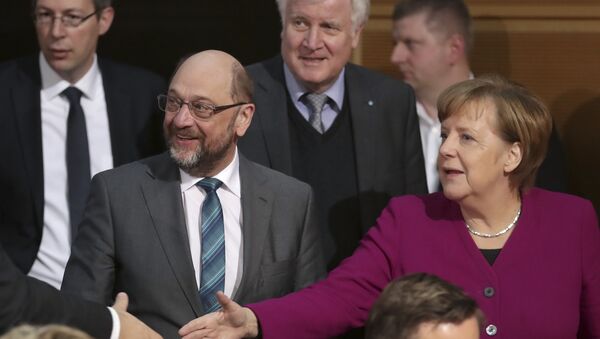Sputnik: If this ultimatum is not fulfilled, what consequences will that have Angela Merkel and can you comment on her actual position right now in terms of government and support and what should she really do to preserve her position?
Philip Anderson: As we all know, she is always a person who claims to negotiate or to maintain dialogue in any kind of situation. That's the attitude she's taking here: not being confrontational because she knows that, on the one hand, the CSU is under pressure, and the CSU, to some extent, is behaving irrationally. But she knows what the price could be if her coalition falls apart, that would be catastrophic for the German government; it would have repercussions, reverberations, across Europe. So she is prepared to compromise to some extent, some would say, facing a dictate on the part of the CSU politicians that she's got to get some kind of agreement from Europe.
In the next two weeks, ideally, there should be some kind of de-escalation so that even if she doesn't manage to attain a radical change in policy, which is very unlikely, they'd be able to say, "Well, she's done her best, lets come to some kind of agreement on this."
READ MORE: German Government in Jeopardy Amid CSU/CDU Row Over Tougher Refugee Policy
What we can definitely say is that CSU behind the scenes must be under enormous pressure from all the CDU's sister parties and their associations in the other 15 German states. And there is one point of potential massive pressure, which the CDU can subject the party here in the south, too.
If the CSU really went for the break, if they said "OK, we don't care, we're prepared to allow the coalition to go under," then what the CDU can say is "OK, in the case of the next election, we, as an independent party, will also stand for election and take some of your votes."
Sputnik: Do you perceive a threat that this coalition could actually fall apart right now?
Philip Anderson: Yes, there is a threat. This is a real danger. Everything you read in the media, in the German media and the international media indicates that in a way — I don't want to be too polemical about this — the CSU are behaving like fire-raisers. They're standing in the lobby of the building, they've got torches in their hands and they're saying, "Shall we chant, shan't we?" Of course, that's extraordinarily dangerous. Things could get out of control.
READ MORE: Berlin on Satirical Tweet on CDU/CSU Alliance Collapse: 'We Should Keep Calm'
Sputnik: What would be the consequences if it did fall apart?
Philip Anderson: To some extent, we'd have to say, incalculable. It would almost certainly lead to Angela Merkel having to resign and not being able to continue as chancellor. If that were the case, then there would be new elections, and the biggest danger of this is that it could lead to a kind of populist policy, which the CSU has been pushing, actually promotes the interest of the party to their right, Alternative for Germany. The main thing that Alternative for Germany has been pushing in terms of personnel policy-making has been saying, "Merkel must go."
Now, I think, if there would be new elections, parties to the right, say, Alternative for Germany, would come about and say, "Give us your votes. We will push for an alternative."
The views and opinions expressed by Philip Anderson are those of the speaker and do not necessarily reflect the position of Sputnik.





